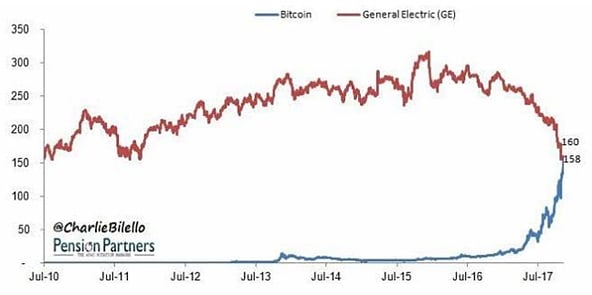These days, you can’t mention “blockchain” without someone else bringing up bitcoin. Of course, it’s an intriguing topic. A digital coin, with no value at all, suddenly skyrockets and makes people rich, out of thin air! It must be a bubble, scam, fraud - even criminal!
Or is it?
What if, instead, the rise of cryptocurrencies signals the end of an era, one that failed to implement a global monetary system with banks? Could it be the beginning of a financial revolution, one that brings access to money to everyone, everywhere?
In this article, we look at Bitcoin and other cryptocurrencies from the perspective of financial institutions. We explore how these new currencies could lead to a shift in power. Of course, we couldn’t paint a complete picture without addressing some of the uncertainties and perceived insecurity of cryptocurrencies.
Big Bubbles?
Of the world’s total population, 39% does not have a bank account but has access to the internet and mobile devices. According to the UN’s State of the World Population Report for 2011, half of the world’s population is under the age of 25. This means that nearly 50% of our planet’s population has never known the world without the internet.
The value increase of Bitcoin is without precedent. Is this the biggest bubble ever, or are we at the dawn of a new era? Could cryptocurrency change finance and trading in the same way the internet changed information and communication?
With all this in mind, it seems reasonable to wonder if banks, as we know them today, will remain relevant in the future. It seems worthwhile for these institutions to consider how they might benefit from blockchain technology.
Bitcoin has seen a 1200% increase in value over 2017 and currently has a daily trading volume of more than 10 billion. That’s more than Apple stocks. Its total market cap as the day of writing was over 200 billion, which is more than GE, the once largest company in the world.

Figure 1. Bitcoin vs. General Electric - Market Cap (Billions)
Bitcoin and Cryptocurrencies
Many people use the term “Bitcoin” when they are actually referring to “cryptocurrencies,” or “digital cash” in general. Cryptocurrencies use blockchain technology and have the characteristics of cash, but are made digitally. They share the benefits of cash and the ease of the internet: accessibility.
Of the many cryptocurrencies, Bitcoin is the oldest and most well-known. It has a limited supply, and its transactions are costly and slow. Like gold, it's used as a store of value. As a currency, it’s not that convenient, but it is still possible to trade with it.
Different cryptocurrencies have different use cases. Some are meant for high-speed, high-volume transactions, others are meant to be used anonymously. A common misunderstanding about Bitcoin is that it would be anonymous, which it is not. Although transactions are hard be traced back to an identified person directly, all transactions are completely transparent and available for anyone to trace.
No company owns Bitcoin, just as no one owns the internet. Both are self-distributed. But, as the value of cryptocurrencies increases, the technology can’t go unnoticed. Despite its immaturity, major financial institutions, banks and governments are beginning to take the enormous potential of blockchain seriously.

Blockchain
Blockchain technology is used via the internet to create an impenetrable transaction history chain that all participating members share and update. It’s a distributed bookkeeping method that’s secured by mathematical challenges and encryption. The more participating members the network gets, the stronger it gets.

Figure 2. How changes get made on a blockchain.
A Shift in Power
Money means power. And power usually doesn’t shift without a bang. With the rise of cryptocurrencies, financial power is on the edge of disruption. Cryptocurrencies have all the characteristics of cash, without the limitations of country borders, regulations or control. So, it’s no wonder that big banks and governments have might be feeling threatened- their realm of control is at stake. Will cryptocurrencies disrupt banking the same way the internet disrupted the communication industries? What will be the blockchain equivalent to Whatsapp?
Fear, Uncertainty, and Doubt (FUD)
With so many interests at stake, it’s not surprising that governments and large financial institutions continue to warn about the dangers of cryptocurrencies. They tell us that criminals use it to make illegal purchases on the dark web. Or, that it’s not secure and hackers can steal your money. We’re told that cryptocurrency is not backed by any real value asset and that investing in it is extremely risky.
All of that is true. But it’s always been true of trading any form of “cash.” The dangers of trading cash are not implicit to its actual value. Criminals have used suitcases full of cash to buy illegal stuff in dark alleys since bills were first printed. Banks have been robbed of their gold since the first vaults opened.
So, what’s the real fear around cryptocurrency? The digital aspect? Politics? Perhaps it’s simply the adage, when one’s position is threatened, attack is the best defense.
The Digital Age
So, many questions still remain. Will we all be paid in some form of cryptocurrency in the future, or will traditional banking endure? What will happen with cryptocurrency if and when more people trust it, or if another financial crisis hits?
Both systems can coexist - it’s not about which is best. It’s about choosing the best solution for a given situation.
Bitcoin was initially created as a response to the financial crisis in 2009. It was designed as an alternative to banking - one that didn’t require printing money out of thin air or dragging the world into yet another financial crisis. Since banks had proven to be untrustworthy, it was created to distribute power and to provide transparency. Like many other open source initiatives, Bitcoin was a holistic project conceived to make the world a better place.
Bitcoin revolutionized our thinking and lead to an explosion of different cryptocurrencies and other innovations based on the principle of distributed validation and consensus.
Over the last years, we’ve seen so many disruptive initiatives, it’s kind of strange that, while everybody owns a smartphone, we still pay for our groceries by transferring money through a third party. Consumers simply don’t have a choice but to use the one system. Money is managed in the way that we used to send letters and postcards- it’s sent to a central post office, verified, moved to the next hub, and finally delivered.
Cryptocurrencies are to banks what email was to postcards.
Considering the speed in which other markets digitized, it seems likely that banks will go the way of the post office and postcard. They will still exist, but digital alternatives will reduce their power and presence significantly. Neither banks nor governments will let that happen without a fight. But they’ve proven to move slowly. The technology is already here, and more and more people are adopting it. People already make peer to peer transactions with the ease of sending an e-mail, so avoid both the cost of the bank and notice of a government. Everyone can send money to everyone within seconds and without anybody knowing it. But again, there are risks.
"Everyone is walking around with a Swiss bank account in their pocket.", Barack Obama
Cryptocurrencies are a severe threat to the traditional financial system. In a rapidly digitizing world where most people in developing countries have never had access to banks, but do own a mobile phone, cryptocurrency adoption is the most logical scenario. It will not happen overnight, but eventually, the masses will adopt cryptocurrencies and the system will have to change.
Banks and Financial Institutions
But there are great opportunities for banks too. By implementing blockchain and the use of their own cryptocurrency or tokens, banks can radically improve their security and speed while cutting costs in the meantime. This has a huge potential for businesses too, providing them the possibility of performing international transactions in less than a few seconds without the current delay and costs.
Including tax-enforcement and governments as nodes in the blockchain will give them real-time insights in all transactions. A lot of the current financial handling can then be automated. All this this could have a major impact on banking and the roles of banks in the future.
Conclusion
Back in the eighties, nobody knew if it was a wise choice to invest in Apple, IBM, Microsoft, Google etc. Or why e-mail was useful, and if record labels and video-rental were at risk. It turned out none was a bad investment and Netflix and Spotify are major players now. We might see the same thing happening now. We are aware that blockchain technology exists, and cryptocurrencies exist, and in one or another form, they are here to stay. We are probably still at the beginning of a second big tech evolution like once that of the internet was. Being aware is one, but this one is different as it brings great opportunities and could cause huge shifts in financial structures and power. One thing is for sure, the blockchain is unstoppable. As long as there is an internet, there will be blockchain.
This article is part of the report Urgent Future - Blockchain.






